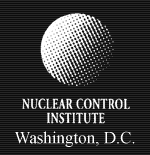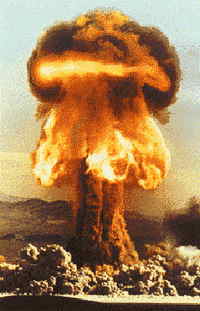The theft of less than 20 pounds of plutonium or
40 pounds of bomb-grade uranium from civilian programs
could result in a nuclear explosion like the 35 kiloton blast
pictured here (equivalent to 70 million pounds of TNT).
With tons of atom-bomb materials in commerce, such
explosions could become commonplace.
Beyond the immediate threat of nuclear smuggling and
nuclear terrorism, there's a larger threat: nations that
stockpile plutonium and bomb-grade uranium for
peaceful purposes can convert these fuels into
nuclear weapons at any time.
That's what Iraq did with its "peaceful" supply of
bomb-grade uranium in 1990 until the Gulf War
interrupted its crash bomb program.
It is not too late to prevent the spread of nuclear
weapons. To find out how . . . .
Go to
1996-2003 Nuclear Control Institute
1000 Connecticut Avenue NW, Suite 410
Washington, DC, 20036, U.S.A.
Tel: 202-822-8444, Fax: 202-452-0892
E-mail: mail@nci.org
Publisher: Paul Leventhal, NCI Design: ATiTUD.com, e-mail




